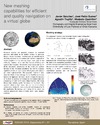Identificador persistente para citar o vincular este elemento:
https://accedacris.ulpgc.es/jspui/handle/10553/17851
| Título: | New meshing capabilities for efficient and quality navigation on a virtual globe | Autores/as: | Sánchez, Javier Suárez, Jose Pablo Trujillo-Pino, Agustín Castrillón-Santana, Modesto |
Clasificación UNESCO: | 330499 Otras (especificar) | Palabras clave: | Visualización gráfica | Fecha de publicación: | 2010 | Resumen: | Polygonal meshes are powerful structures to represent geometric information of the Earth’s surface. In particular, triangle meshes have been massively used as a reliable way to efficiently represent the land surface with real time responses in virtual navigation. In this work we present new ideas for the underlying treatment of a mesh that improve efficiency and quality in the navigation. We explore critical issues such as onthe-fly refinement, smoothness of the mesh and partition methods for the refinement operations. We test the proposed capabilities inside an open source virtual globe and compare with other implementations. The proposed model is a viewdependent level of detail strategy that is classified as a binary triangle tree approach. We study how to increase the accuracy of the mesh by splitting the triangles by their longest edge and propagating the splits to the surrounding neighbors. This binary triangle tree naturally avoids the cracks on the terrain. This approach allows a high frame rate and the frame-to-frame coherence is maintained thanks to the split and merge policy. In this application, the textures and meshes of the terrain are obtained progressively from a remote server using standard protocols. | URI: | https://accedacris.ulpgc.es/handle/10553/17851 | Fuente: | Conference on Free and Open Source Software for Geospatial (FOSS4G), Barcelona, Spain |
| Colección: | Póster de congreso |
Visitas
65
actualizado el 10-ene-2026
Descargas
16
actualizado el 10-ene-2026
Google ScholarTM
Verifica
Comparte
Exporta metadatos
Este elemento está sujeto a una licencia Licencia Creative Commons

